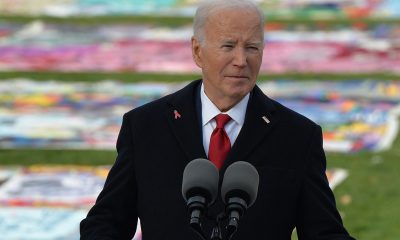Russia
Gay TikTok couple arrested in Russia, one to be deported
The couple was arrested after running afoul of Russia’s “gay propaganda” law for their videos on TikTok, Instagram and YouTube

KAZAN, Republic of Tatarstan, Russia – A young gay couple has been arrested with one facing deportation back to his native China after running afoul of Russia’s “gay propaganda” law signed by Russian president Vladimir Putin last December, for their videos on TikTok, Instagram and YouTube.
Gela Gogishvili, 23, a Russian national and his boyfriend Chinese national Haoyang Xu, 21, live in Kazan, the fifth-largest city in Russia located on the banks of the Volga and Kazanka rivers in southwest Russia. The young couple had been documenting their everyday lives with their 740,000 followers on TikTok and 64,900 subscribers on YouTube.
The couple was arrested this past Thursday and although Gogishvili was released, Xu remains being held in a Russian detention center for migrants before being deported in seven days.
In an interview with Newsweek’s Shannon Power “We were very scared … it became a living hell because the impossible happened,” Gogishvili said.
According to Moscow-based LGBTQ group, DELO LGBT+ a local citizen tipped off police to Gogishvili and Xu’s social media content.
“The ‘gay propaganda’ law falls under the Administrative Code, but the Kazan police’s criminal investigation department has been looking for these guys … and they are treated like they are dangerous criminal offenders,” Vladimir Komov, senior partner and a spokesperson for the organization said.
In a court hearing Friday, Xu who had moved to Russia to study Russian at university, was found guilty of violating the enhanced “gay propaganda” law and sentenced to a week in the detention center for migrants before being deported. The couple’s attorneys are appealing that decision.
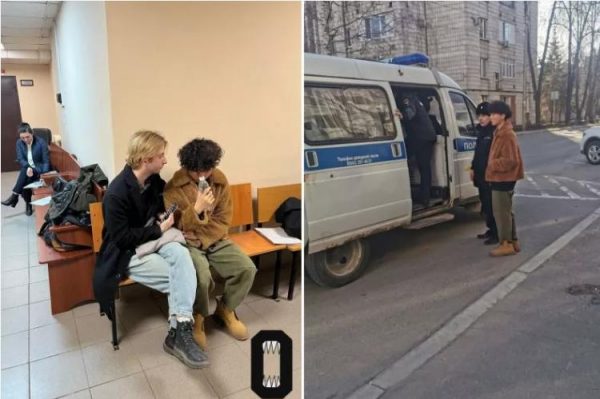
(Photo Credit: Gela Gogishvili)
According to Newsweek: Police stopped the couple in the street after they had attended a museum with friends and demanded Xu present his papers, such as passport and student visa, but he couldn’t because he did not carry them on him. The officers then escorted them to get his documentation and took them in a police car to the Yapeyeva police station.
But once they got there, police informed the men they were being charged under Article 6.21 of Russia’s Administrative Offenses Code, otherwise known as the “gay propaganda” law.
“The policeman told us that it’s not that Haoyang didn’t have his papers on him but we will be prosecuted for ‘gay propaganda’ and … Haoyang could be deported,” Gogishvili said.
DELO LGBT+‘s Komov said that he could not understand why the couple had been arrested because they were “quite popular” on their social media platforms and their content was “not erotic” by any standard.
“They do TikToks about their everyday life as a gay couple, how they do chores, how they wash the dishes, how they communicate and only share a few romantic moments such as kissing … and some cuddling,” Komov said.
“How did the police informer and the Kazan police deem there was LGBT+ ‘propaganda’ on their social media? These guys just posted videos in which they kiss, hug and show their favorite sleeping poses.
“All this was considered an inappropriate demonstration of ‘homosexual intimacy’.”
Russian Prime Minister Mikhail Mishustin had issued a decree last December that directs the Russian Federal Service for Supervision of Communications, Information Technology and Mass Media, abbreviated as Roskomnadzor, to ban any websites that contain information about LGBTQ+ identities without a court order.
As a part of the stepped up enhancements of the law, “Information propagating non-traditional sexual relations and (or) preferences” now serves as grounds for blacklisting any website in Russia and more recently used as a tool by Russian police and prosecutors against those posting prohibited material on their personal social media platforms.
Russia
Vladimir Putin takes oath, begins fifth term as Russia’s president
Putin’s inaugural speech today signaled his future intentions on conducting the war in Ukraine and his ongoing persecution of LGBTQ+ Russians
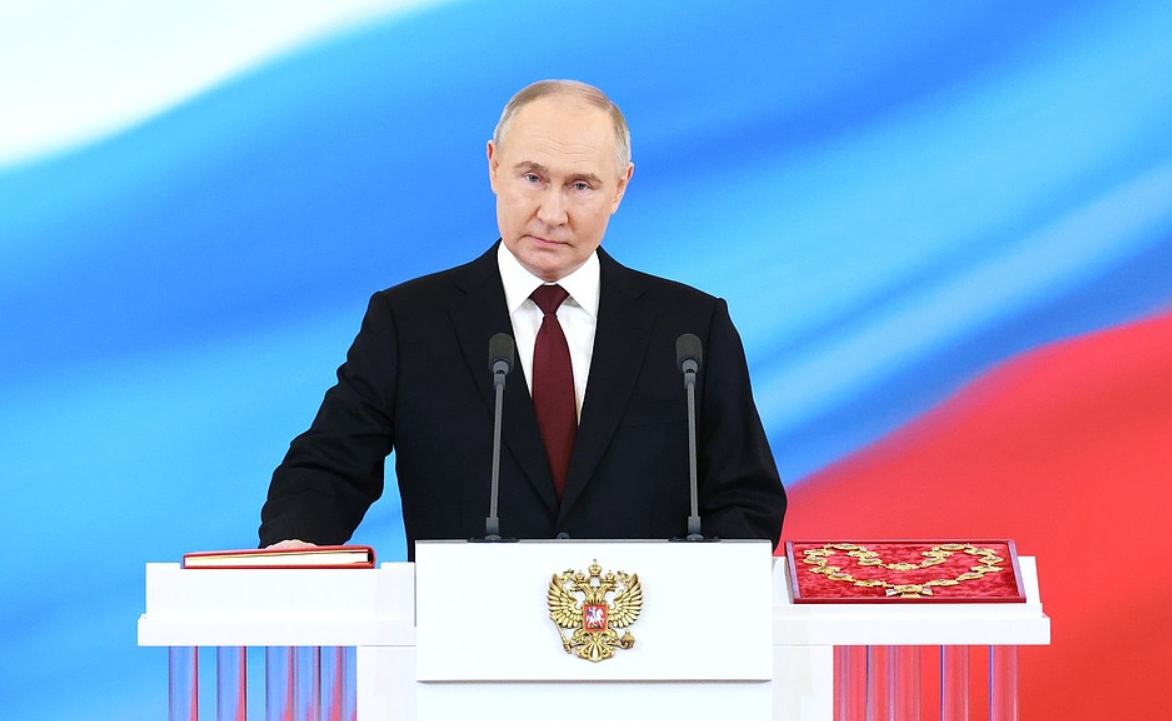
MOSCOW, Russia – On Tuesday, Vladimir Putin took his oath of office becoming the second ever longest serving leader of the modern Russian state since Soviet dictator Joseph Stalin, who held power from 1922 until his death in 1953.
Putin’s tenure in office has been marked by his acquisition of concentrated political power in part due to his eradication and imprisonment or the deaths of his political opponents, such as his rumored unproven involvement in the assassination of fierce Putin critic Boris Nemtsov on February 27, 2015, just steps away from the gate to the Kremlin, and more recently in the prosecution and imprisonment of another high profile Putin critic, Alexei Anatolyevich Navalny, who died earlier this year on February 16 at a penal colony north of the Arctic Circle.
Putin ordered military operations in August 2008, which led to the Russo-Georgian War and diplomatic relations were broken. To this day, the two countries have maintained no formal diplomatic relations. Then in February and March 2014, Russian troops at his direction invaded the Crimean Peninsula, part of Ukraine, and annexed it. The resulting hostilities also spread to the far-eastern Ukrainian oblasts, [provinces] which culminated with Russia invading Ukraine on February 24, 2022, an escalation of the Russo-Ukrainian War that started in 2014. The invasion became the largest attack on a European country since the end of the Second World War in 1945.
As the war drags on Putin’s threats of military escalation against NATO countries and use of battlefield nuclear weapons has created a tense relationship with a majority of the European Union as well as with the United States. Russia has been heavily sanctioned by the West and is turning to other totalitarian regimes like China, Iran and North Korea for support.
In his inaugural speech Putin made oblique reference to his oft stated desire to recreate a hybrid of the former Soviet Union:
“In these solemn and crucial moments of assuming the office of the President, I would like to extend my heartfelt gratitude to the citizens of Russia across all regions of our country, as well as those living in the historical territories of Russia who have won their right to stand united with our Motherland”
The Russian president then thanked the forces fighting in the invasion of Ukraine saying:
“I humbly honour our heroes, the participants in the special military operation, and all those who are fighting for our Fatherland. I would like to thank you again for the trust you have placed in me and for your unwavering support. These words are directed to every citizen of Russia.”
On the domestic front Putin has stifled media outlets with draconian laws passed designed to keep the Russian population largely ignorant of the cost both human lives and governmental spending as the warfare in Ukraine drags on and losses to the Russian military continue.
The Associated Press reported neither the U.S., U.K. nor German ambassadors attended. The U.S. Embassy said Ambassador Lynne Tracy was out of the country on “prescheduled, personal travel.”
A handful of European Union envoys attended even though top EU diplomat Josep Borrell said he told them “the right thing to do is not to attend this inauguration,” because Putin is the subject of an arrest warrant by the International Criminal Court for war crimes, accusing him of personal responsibility for the abductions of children from Ukraine.
In his speech Putin issued a veiled threat to critics of his regime that dissention would not be tolerated:
“We can see that the atmosphere in society has changed, and how much we now value reliability, responsibility, sincerity, integrity, generosity and courage. I will do everything in my power to ensure that those who have displayed these admirable human and professional traits, and who have proved their loyalty to the Fatherland through their deeds, achieve leading positions in state governance, the economy and all other spheres.
We must ensure reliable continuity in the development of our country for decades to come and bring up new generations who will strengthen Russia’s might and develop our state based on interethnic accord, the preservation of the traditions of all ethnic groups living in Russia, a civilizational nation united by the Russian language and our multi-ethnic culture.”
The Russian president has also targeted the country’s LGBTQ+ people with passage of multiple laws that forbid public mention or acknowledgment of queer Russians. In his speech he emphasized his commitment to maintaining “family values.”
“Our top priority is the preservation of the people. I am confident that the support of centuries-old family values and traditions will continue to unite public and religious associations, political parties, and all levels of government.
Our decisions regarding the development of the country and its regions must be effective and fair and must promote the prosperity of Russian families and improve their quality of life,” he said.
The Wilson Center located in Washington D.C., a nonpartisan think tank, noted recently:
“Escalating state discrimination against the LGBTQ+ community in Russia is directly informed by the Putin regime’s struggle to maintain legitimacy and public support, especially as Russia’s war in Ukraine drags on. Russian federal elections are scheduled for 2024, and officials are reportedly planning to project record levels of public support for Putin.”
“The war in Ukraine and discrimination against the LGBTQ+ community are both popular policies among the socially conservative interest groups that make up Putin’s strongest base of support, and Russian policymakers draw clear connections between the Kremlin’s narrative that Russia is fighting Western ideology by proxy in Ukraine and the Kremlin’s attack on the LGBTQ+ experience in Russia.”
Putin’s inaugural speech today signaled his future intentions on conducting the war in Ukraine and his ongoing persecution of LGBTQ+ Russians.
Russia
Trans journalist who enlisted in Ukrainian military designated a terrorist by Russia
Sarah Ashton-Cirillo is from the US

MOSCOW — A Transgender journalist from the U.S. who enlisted in the Ukrainian military has been designated a terrorist by Russia.
“The Kremlin added me to Russia’s official international terrorism list,” wrote Sarah Ashton-Cirillo in a Feb. 5 post on her X account.
Russia launched its war against Ukraine on Feb. 24, 2022.
Ashton-Cirillo was a journalist when she began to cover the Armed Forces of Ukraine’s Kharkiv Defense Forces. She later enlisted and is now a junior sergeant. Ashton-Cirillo has also traveled to the U.S. several times on behalf of the Ukrainian Defense Ministry.
Shrapnel from a Russian artillery shell wounded Ashton-Cirillo last February while she was working as a senior combat medic in a trench near Kreminna, a city in eastern Ukraine.
“For Russia to name me as an officially sanctioned terrorist is laughable enough, however what was truly indicative of the hate coming from the Kremlin’s regime was that every press release and article in Russia about my being placed on Putin’s terrorism list was prefaced with the fact that I am Trans,” Ashton-Cirillo told the Washington Blade on Friday. “The Russian government is genocidal and hate ridden and this is why it will collapse.”
Russia
Ban on transition therapy & surgery signed by Russian President
LGBTQ+ activists said that this law will lead to an increase in attempted suicides among trans youth unable to access medical care
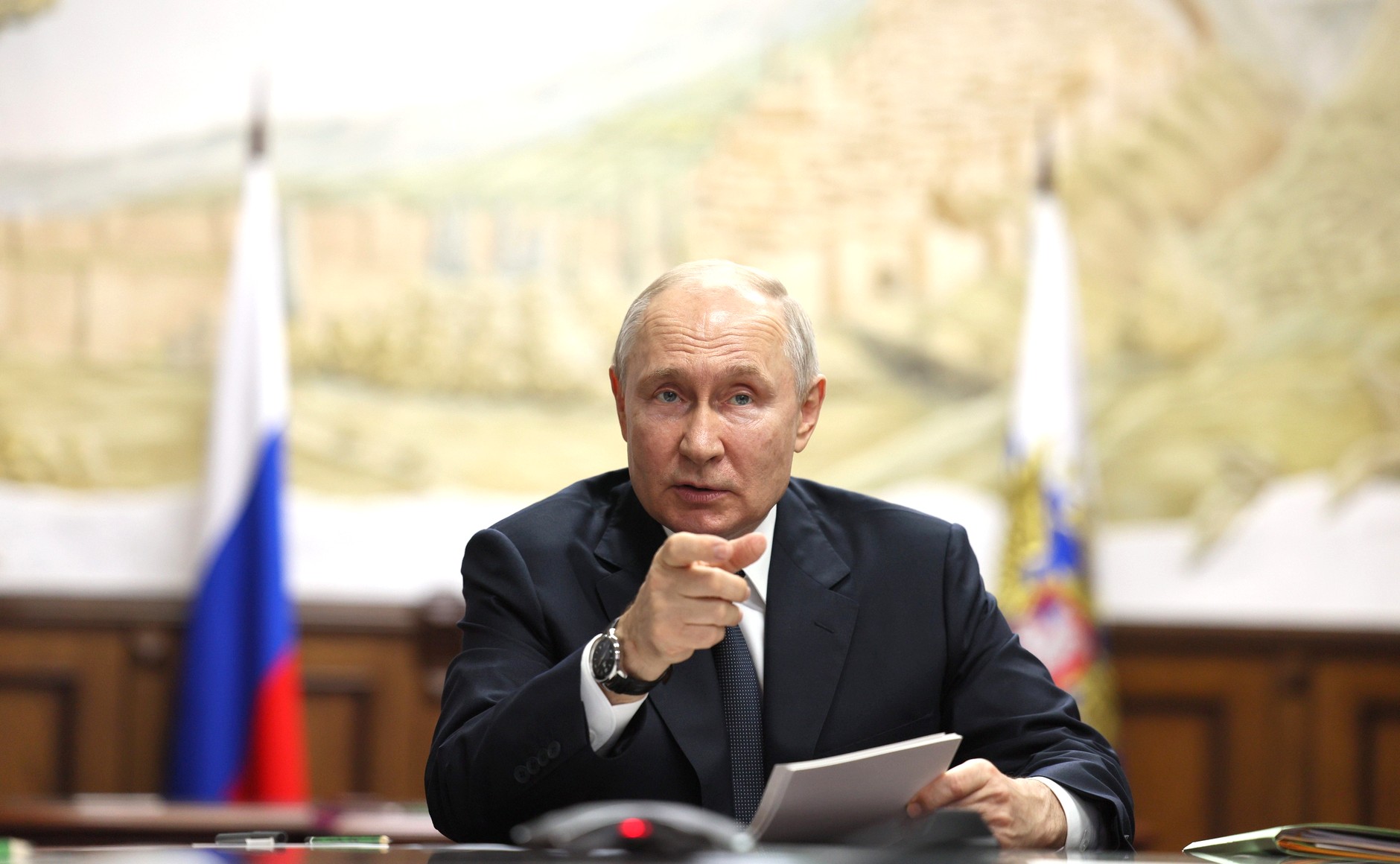
MOSCOW, Russia – Legislation that will effectively ban the existence of transgender Russians was signed on Monday as expected by Russian President Vladimir Putin.
The new law, which takes effective immediately, was passed earlier this month by the State Duma, the lower House of the Russian parliament and then last week by the Federal Council or upper body.
The law now bans Russians from changing their gender on official government identity documents including internal and external passports, driver’s licenses, and birth certificates, although gender marker changes had been legal for 26 years since 1997.
Medical healthcare providers are now banned from “performing medical interventions designed to change the sex of a person,” including surgery and prescribing hormone therapy.
The law which human rights organizations have labeled draconian and barbaric also bans individuals who have undergone gender reassignment from adopting children and annuls marriages in which one of the partners is transgender.
LGBTQ+ activists have warned that the law will lead to a further increase in already high rates of suicide and suicide attempts among transgender Russians. Worse say sympathetic physicians and transgender rights advocates, it will foment an underground market for surgeries and medications, which are dangerous as unproven drugs or outright fake drugs may cause irreparable harm.
LGBTQ+ activists also said that this law will lead to an increase in attempted suicides among trans youth unable to access medical care.
“The way how these people see their future is collapsing,” Yan Dvorkin, the head of Center-T, a group that helps transgender and non-binary people in Russia, said in an interview with The Moscow Times earlier this month.
During debate over the law, Deputy Speaker of the State Duma, [Parliament] Pytor Tolstoy, a co-sponsor of the legislation, pointed out that banning the “practise of transgenderism” was in the interest of national security.
The diagnosis of “transsexualism,” he added, refers to gender identity disorders and is the basis for recognizing a citizen as unfit for military service. In addition, “we must not forget that by changing the sex of one of the partners, a homosexual couple gets the right to adopt a child. Unfortunately, there are already such cases in Russia,” he said.
LGBTQ+ and human rights organization ILGA-Europe issued a statement condemning the actions of the Russian Duma and offered support and solidarity with the Russian transgender and queer communities.
“We firmly assert that such legislation flagrantly violates fundamental human rights standards and principles.
ILGA-Europe firmly believe in the inherent dignity and equal rights of all individuals, regardless of their gender identity or expression. International human rights standards, including the Universal Declaration of Human Rights, emphasize that everyone has the right to self-determination, privacy, and the highest attainable standard of physical and mental health. Denying trans and gender diverse individuals access to trans-specific healthcare and legal gender recognition blatantly disregards the international human rights framework,” ILGA-Europe wrote.
A young woman who only identified herself to Russian freelance journalist Sergei Dimitrov by the name Elena, told him in an interview in St. Petersburg earlier this month:
“There is no safety anymore, soon they will openly hunt us like swine, we no right to exist they say,” she said.
The young woman also said that since the latest passage of laws including expansion of the Russia’s “gay propaganda” law to include adults last December, coupled with the crackdown by the Russian Federal Service for Supervision of Communications, Information Technology and Mass Media, abbreviated as Roskomnadzor, on any websites and on popular phone apps that cater to LGBTQ+ people, she has now begun efforts in earnest to leave the country.
Related:
Russia
Trans & gender diverse rights in Russia deteriorating rapidly
Healthcare providers would be banned from performing medical interventions including surgery & prescribing hormone therapy
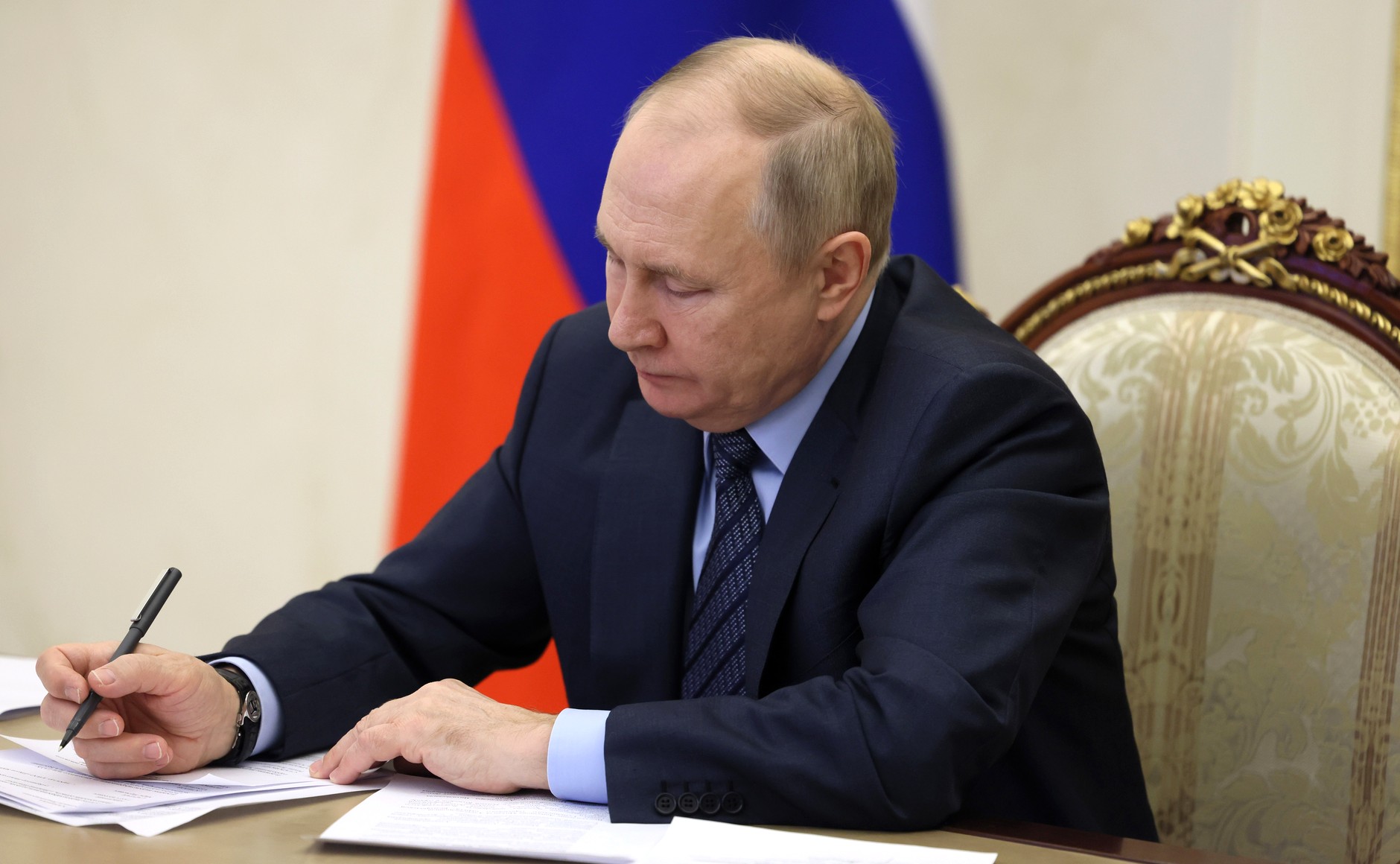
SAINT PETERSBURG, Russia – In a scene eerily reminiscent of a 1960’s cold war era novel, the young woman sat nervously at the outside table of the café not far from the museum district and main railroad station in St. Petersburg, chain smoking French Gitanes and toying with the food on her plate in front of her. She kept nervously glancing around as if she expected to suddenly be swept up in a secret police raid.
The primary cause of her anxiety and discomfiture she explained to the journalist sitting across the table from her, was that as a trans woman, she felt threatened and afraid. Unable to continue to live in her native region in the Sverdlovsk Oblast, [region] in the Ural mountains she had moved first to the capital city of the Russian Federation, Moscow, then as tensions rose over the treatment of LGBTQ+ Russians she fled to St. Petersburg.
“There is no safety anymore, soon they will openly hunt us like swine, we no right to exist they say,” she told Russian freelance journalist Sergei Dimitrov.
The young woman who only identified herself to Dimitrov by the name Elena, said that since the latest passage of laws including expansion of the Russia’s “gay propaganda” law to include adults last December, coupled with the crackdown by the Russian Federal Service for Supervision of Communications, Information Technology and Mass Media, abbreviated as Roskomnadzor, on any websites and on popular phone apps that cater to LGBTQ+ people, she has now begun efforts in earnest to leave the country.
Last week the lower house of the Russian Parliament, colloquially referred to as the State Duma, passed on its final reading a bill that would outlaw gender transitioning procedures in the Russian Federation. The measure now heads to the Federation Council, or upper House where it is expected to pass in the scheduled vote on July 19 and then transmitted to Russian President Vladimir Putin for his approval and signature which is expected.
Deputy Speaker of the State Duma, [Parliament] Pytor Tolstoy, a co-sponsor of the legislation, pointed out that banning the “practise of transgenderism” was in the interest of national security.
The diagnosis of “transsexualism,” he added, refers to gender identity disorders and is the basis for recognizing a citizen as unfit for military service. In addition, “we must not forget that by changing the sex of one of the partners, a homosexual couple gets the right to adopt a child. Unfortunately, there are already such cases in Russia,” he said.
The proposed law would bar Russians from changing their gender on official government identity documents including internal and external passports, driver’s licenses, and birth certificates, although gender marker changes had been legal for 26 years since 1997.
Medical healthcare providers would be banned from “performing medical interventions designed to change the sex of a person,” including surgery and prescribing hormone therapy.
In a floor speech prior to the vote last month after the measure’s first reading, Tolstoy blamed the West for what he deemed a profitable medical industry:
“The Western transgender industry is trying in this way to seep into our country, to break through a window for its multi-billion dollar business,” Tolstoy said. Then he claimed there is already a developed network of clinics in Russia, “it includes trans-friendly doctors and psychologists, and all this operates with the active support of LGBT organizations. However, in the past six months they have changed their names to more, perhaps harmless ones,” he said inferring that the recent expansion of the country’s law banning LGBT propaganda was somehow responsible for those changes.
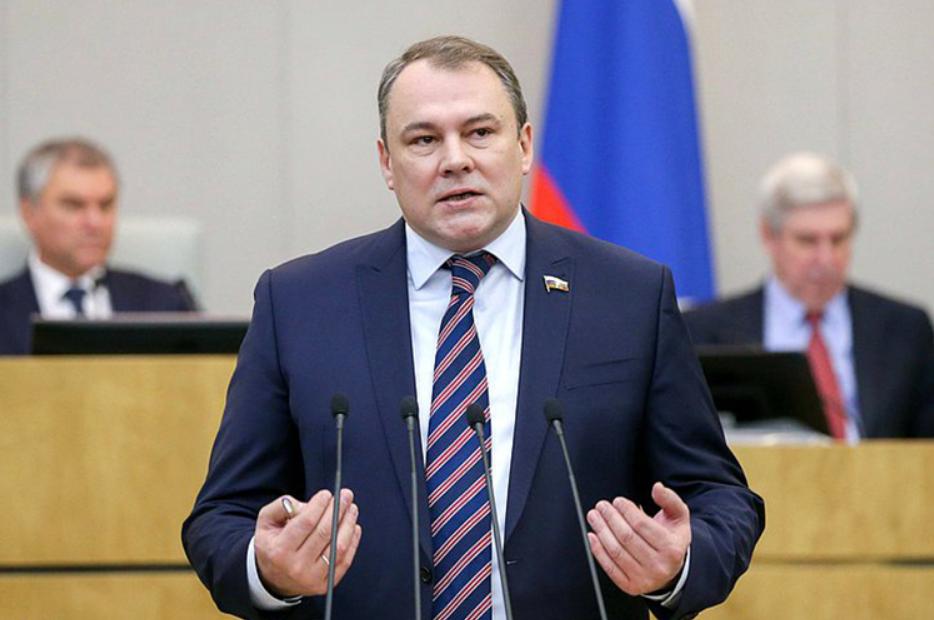
(Photo Credit: Government of Russia/Duma)
According to Tolstoy, gender reassignment surgery is “a very profitable area of medical services. And it’s understandable why a number of doctors defend this area so fiercely, hiding behind academic knowledge, including those obtained abroad while studying in the United States and other countries,” he said, “running into” Western medical education.
Provisions to the bill in its second reading, approved on Thursday, also ban trans people from adopting or fostering children, and force them to annul their marriages if one of the couple subsequently changes gender.
LGBTQ+ and human rights organization ILGA-Europe issued a statement condemning the actions of the Russian Duma and offered support and solidarity with the Russian transgender and queer communities.
“We firmly assert that such legislation flagrantly violates fundamental human rights standards and principles.
ILGA-Europe firmly believe in the inherent dignity and equal rights of all individuals, regardless of their gender identity or expression. International human rights standards, including the Universal Declaration of Human Rights, emphasize that everyone has the right to self-determination, privacy, and the highest attainable standard of physical and mental health. Denying trans and gender diverse individuals access to trans-specific healthcare and legal gender recognition blatantly disregards the international human rights framework,” ILGA-Europe wrote.
Sympathetic physicians and transgender rights advocates have warned that the ban is poised to create a black market for hormone substitutes, some of which likely will be dangerous and lead to an increase in attempted suicides among trans youth unable to access medical care.
ILGA-Europe’s statement also warned: “Furthermore, the bill invalidates all certificates of legal gender recognition for individuals who have undergone transition-related surgery but not yet changed the gender marker in their passport. This is a violation of their right to privacy, places trans people in legal limbo, and creates unnecessary burdens on trans people, forcing them to disclose their private and medical history and exposing them to discrimination, harassment and violence.”
According to journalist Sergei Dimitrov, that particular provision of the legislation is specifically applicable to Elena, who while having completed transition-related surgery has been unable to get the gender marker changed on her documents, which with the current war in Ukraine has further complicated her life.
She told Dimitrov that demands for her to present herself for required military service, under her former name and gender, was yet another reason she had fled. Now she says, she is trapped and unable to legally leave, entertaining the option of illegally entering the European Union and asking for asylum, most likely to neighboring Latvia, or Estonia.
Independent news outlet Mediazona reported in February 2023 that the number of passports issued due to “gender change” has more than doubled in 2022 compared with two years earlier -– from 428 in 2020 to 936 last year, according to Russia’s Interior Ministry.
In justifying the provision, lawmakers cited concerns that men are using the relatively simple procedure of changing gender in official documents to dodge the military draft.
Another point was raised by a lawmaker who asked what to do with the 3 thousand people plus trans people who have already managed to change their gender and documents. Tolstoy responded noted that the law does not have retroactive effect.
Vyacheslav Volodin, the speaker of the State Duma, called gender transitioning “pure satanism.”
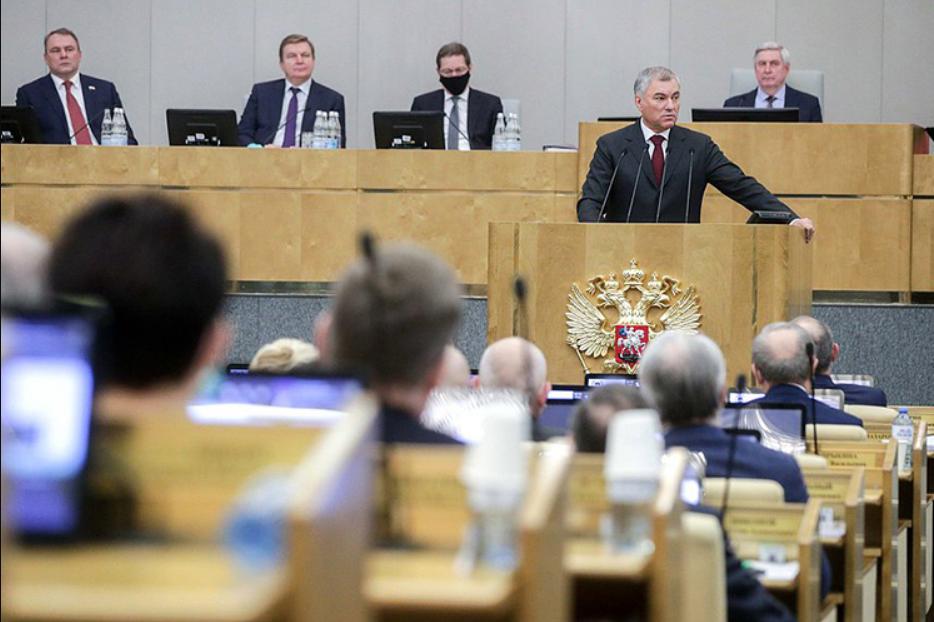
(Photo Credit: Government of Russia/Duma)
Akram Kubanychbekov, a Senior Advocacy Officer for ILGA-Europe this past week sent out a ‘dear colleagues’ request for assistance detailing specific needs and actions that will be crucial to assisting trans and gender diverse Russians.
Kubanychbekov wrote:
“Discrimination, violence, and the enactment of oppressive laws have made it increasingly unsafe for trans people to live their lives authentically and without fear. In light of these circumstances, we have reached out local trans organizations to ask them of support trans community need at the moment.
“To address the urgent needs of trans people who wish to leave Russia, there is a need in facilitating support for broadening the criteria for humanitarian visas. By expanding the eligibility criteria, we can ensure that those facing persecution and threats to their safety have a viable pathway to seek refuge in other countries. It is crucial to work together to advocate for this change with governments at the national level to extend our support to trans people seeking a safer environment in safer countries.
“In addition to humanitarian visas, trans organizations [inside the Russian Federation] asked to assist in securing multi-entry, long-term (preferably Schengen) visas for activists, who will continue their important work within Russia but may need to swiftly leave in case of escalating danger. By facilitating the necessary visa support, activists are enabled to carry out their vital work with the knowledge that they have an emergency exit if required.
“We would like to encourage you to stand in solidarity with the local trans organizations in Russia and support their requests.”
Political fallout
Yulia Alyoshina, the country’s first transgender politician, had made plans this past year to run for governor of Russia’s Altay region, an area bordering the former Soviet Republic and now independent nation of Kazakhstan.

Alyoshina, who had been the head of the regional Civic Initiative party, resigned her post after Putin signed the expanded anti-LGBTQ+ law last December. With gubernatorial elections set for this September in the Altay region, party officials had urged her to consider running.
Alyoshina says she didn’t expect anyone in the Civic Initiative party to suggest that she run in the gubernatorial elections. But she figured “well, why not” and agreed. “I’m sure that the fact that I was born in a different body is not as important to voters as my honesty, integrity, and sincere desire to make my native land better,” she told Russian media outlet Novaya Gazeta Europe.
On the topic of Russian society’s relationship to transgender people, Alyoshina told Novaya Gazeta Europe the current political climate is quite bad. She described losing supporters after the Duma passed and Putin signed the anti-LGBTQ+ laws last December. She thinks people have been influenced by the authorities’ rhetoric on “LGBT propaganda.”
In another interview with Russian language media outlet, Meduza, which the Putin government banned in January 2023, Alyoshina reflected on the effects of the bill. She told Meduza that her medical transition took about a year and a half. There were no private clinics in her region where should could go for gender care services, so she was seen at a state psychiatric hospital. It took another year and a half after she was first seen to get a certificate for changing gender markers [on legal documents].
In a phone interview with the Moscow Times just prior to the Duma’s impending vote, Alyoshina confirmed the post she had made on her Telegram channel that she had abandoned her effort to campaign as a gubernatorial candidate.
“I was told by municipal deputies and village heads that the [gender reassignment ban] bill was being considered and that they couldn’t give me their signatures,” Alyoshina told The Moscow Times.
“They told me: ’How can we publicly support a transgender person if the State Duma prohibits transgender people in Russia?” she said.
“By putting our signatures in your support, we will go against the country’s policy, and we have families and children, we don’t want to fall under repression,” Alyoshina quoted the deputies as telling her.
Alyoshina said she was weighing “various options” for her future, but said she would wait for the passing of the gender reassignment law.
“I’m not ready to dive into [my future plans] until the legislation is passed,” she said.
Russia
Russia poised to enact full ban on gender-affirming care
The legislation will need to have three more readings before it can be passed and sent on to Russian President Putin for his signature

MOSCOW – A bill that would outlaw gender transitioning procedures in the Russian Federation passed through its first legislative procedure Wednesday with 400 lawmakers in the Lower House voting in favor and zero votes against.
Deputy Speaker of the State Duma, [Parliament] Pytor Tolstoy, a co-sponsor of the legislation, echoed the sentiments expressed by Russian President Vladimir Putin during political rallies last Fall to bolster public support for his war in Ukraine, referring to transgender people in a highly transphobic way.
“Do we really want, here, in our country, in Russia, instead of ‘mum’ and ‘dad’, to have ‘parent No. 1’, ‘parent No. 2’, ‘No. 3’? Have they gone completely insane? Do we really want … it drilled into children in our schools … that there are supposedly genders besides women and men, and [children to be] offered the chance to undergo sex change operations? … We have a different future, our own future,” Putin said.
Tolstoy pointed out that banning the “practise of transgenderism” was in the interest of national security. The diagnosis of “transsexualism,” he added, refers to gender identity disorders and is the basis for recognizing a citizen as unfit for military service. In addition, “we must not forget that by changing the sex of one of the partners, a homosexual couple gets the right to adopt a child. Unfortunately, there are already such cases in Russia,” he said.
Tolstoy stressed that the legislation, originally introduced in April, was to “protect Russia with its cultural and family values and traditions and to stop the infiltration of the Western anti-family ideology.”
In his floor speech prior to the vote Tolstoy blamed the West for what he deemed a profitable medical industry:
“The Western transgender industry is trying in this way to seep into our country, to break through a window for its multi-billion dollar business,” Tolstoy said. Then he claimed there is already a developed network of clinics in Russia, “it includes trans-friendly doctors and psychologists, and all this operates with the active support of LGBT organizations. However, in the past six months they have changed their names to more, perhaps harmless ones,” he said inferring that the recent expansion of the country’s law banning LGBT propaganda was somehow responsible for those changes.
According to Tolstoy, gender reassignment surgery is “a very profitable area of medical services. And it’s understandable why a number of doctors defend this area so fiercely, hiding behind academic knowledge, including those obtained abroad while studying in the United States and other countries,” he said, “running into” Western medical education.
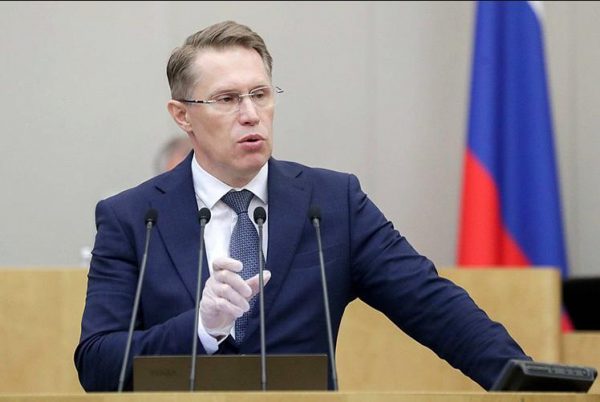
The Minister of Health, Mikhail Murashko, argued that while the ministry generally supports the inadmissibility of gender reassignment only on the basis of the patient’s desire, he cautioned that toughening of decision-making on surgical or hormonal treatment should be based “only on the basis of high-level consultations with qualified physicians, and federal health agencies should be involved in this.”
When pressed for medical exclusions as laid out in the parameters of the legislation, Murashko noted: “There are disorders that are associated specifically with the formation of sex – congenital, hereditary and endocrine diseases. This frequency occurs 1 in 4 thousand newborns, therefore, within this framework, you need to move. For this category of patients, the medical solution regarding endocrine disorders, genetic, is what is prescribed in the legislation- in the proposed bill and is supported, ” he said.
Tolstoy argued the only exceptions should be on corrective surgery for minors n the cases of intersex births. “We are talking about something else. If we leave at least one loophole for an adult, crowds of those homosexuals who want to adopt children, avoid military service and so on will go into this loophole. Therefore, either a complete ban for adults and the ability to correct anomalies for children, or nothing!”
The Associated Press noted that independent news outlet Mediazona reported in February that the number of passports issued due to “gender change” has more than doubled in 2022 compared with two years earlier -– from 428 in 2020 to 936 last year, according to Russia’s Interior Ministry.
In justifying the new bill, lawmakers cited concerns that men are using the relatively simple procedure of changing gender in official documents to dodge the military draft.
Another point was raised by a lawmaker who asked what to do with the 3 thousand people plus trans people who have already managed to change their gender and documents. Tolstoy responded noted that the law does not have retroactive effect.
Vyacheslav Volodin, the speaker of the State Duma, called gender transitioning “pure satanism.”
“Look at what is happening now in the United States of America, where all these new pseudo-values are being propagated,” Volodin said then added: “The proportion of transgender people in the United States among adolescents is already 3 times higher than among the adult population. This is the result of propaganda. The number of children receiving hormone therapy has more than doubled in five years. Moreover, they start pumping hormones into children from the age of 8! In five years, from 2017 to 2021, more than 2,000 gender reassignment surgeries have been performed. It is operations in children aged 13 to 17 years. We do not want this to happen in our country. Let the diabolical policy be carried out in the USA.”
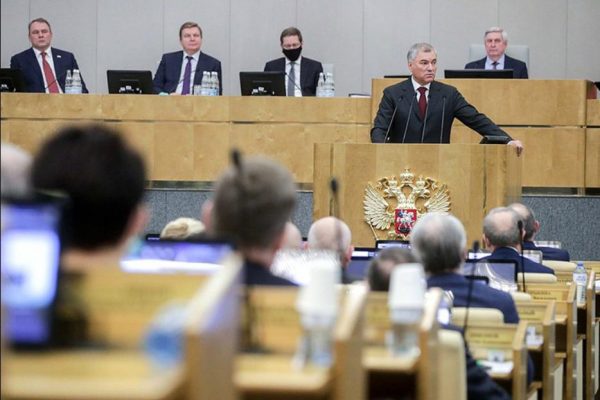
(Photo Credit: Government of Russia/Duma)
The legislation will need to have three more readings along with accompanying public debates in the lower House and then sent to the Upper House before it can be passed and sent on to Russian President Vladimir Putin for his signature to become law.
The only option for those seeking to transition through medical care or changing their gender in documents would be to leave the country human rights lawyer Max Olenichev, who works with the Russian LGBTQ+ community said in an interview with the Associated Press. “Neither medical, nor legal transitioning will be possible without changing the country of residence.”
Russia
Russian government expands anti-LGBTQ law to include websites
In addition to blocking those websites from being viewed in Russia websites that promote “Propaganda of pedophilia & sex change” also listed
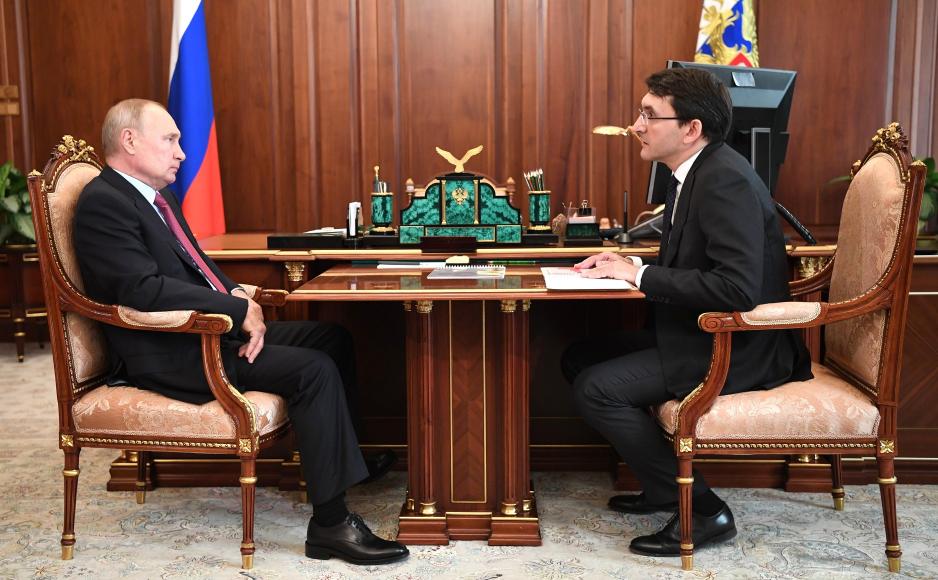
MOSCOW – Russian Prime Minister Mikhail Mishustin issued a decree Christmas Eve expanding and amending Russia’s “gay propaganda” law signed by Russian president Vladimir Putin two weeks ago.
The decree directs the Russian Federal Service for Supervision of Communications, Information Technology and Mass Media, abbreviated as Roskomnadzor, to ban any websites that contain information about LGBTQ+ identities without a court order.
“Information propagating non-traditional sexual relations and (or) preferences” now serves as grounds for blacklisting any website in Russia, alongside those containing child pornography, information about suicide methods, and illegal narcotic production.
In addition to blocking those types of websites from being viewed in the Russian Federation, websites that promote “Propaganda of pedophilia and sex change” are also listed in the government decree signed by the Prime Minister.
The Riga, Latvia, based Russian and English news outlet Meduza reported in early December that in the Russian capitol an anonymous source said library staff in Moscow’s Central Administrative Districts received orders to “pull from the shelves, at our discretion, books with pictures showing ‘LGBT propaganda’”. They were also ordered to remove books critical of Russia’s illegal invasion of Ukraine.
Roskomnadzor also targeted some video games according to multiple reports. Apex Legends, Overwatch, The Last of Us, Life is Strange, The Sims and RimWorld were included in the list of video games targeted.
The English-language newspaper The Moscow Times reported lawmakers have drafted a bill that allows for the jailing of those who have already been fined under Putin’s earlier anti-LGBT law, which banned aiming “LGBT propaganda” at minors. Under the draft legislation, repeat offenders could be sentenced to up to five years in jail.
Russia
Russia releases WNBA star Brittney Griner
Olympic Gold medalist detained in Moscow in February

MOSCOW — Russian authorities have released WNBA star Brittney Griner.
Griner was released in exchange for Viktor Bout, a Russian arms dealer who was serving a 25-year prison sentence in the U.S. The exchange took place in Abu Dhabi in the United Arab Emirates.
Griner had been serving a nine-year prison sentence after a Russian court convicted her on the importation of illegal drugs after Russian customs officials found vape canisters containing cannabis oil in her luggage at Moscow’s Sheremetyevo Airport.
American officials had previously acknowledged their willingness to release Viktor Bout, a Russian arms dealer who is serving a 25-year prison sentence in the U.S., as part of a deal to secure Griner’s release. A senior administration official on Thursday told reporters during a conference call that Russian authorities earlier this week moved Griner from the penal colony where she had been serving her sentence to Moscow.
The official said Griner flew to the United Arab Emirates on Thursday. Special Presidential Envoy for Hostage Affairs Roger Carstens greeted Griner once she landed.
“She is now in the air,” said the official.
President Biden spoke with Griner before she left the United Arab Emirates. The White House tweeted a picture of Biden in the Oval Office with Griner’s wife, Cherelle Griner, Vice President Kamala Harris and Secretary of State Antony Blinken.
“She is safe,” tweeted Biden. “She is on a plane. She is on her way home.”
Cherelle Griner was standing alongside Biden, Harris and Blinken at the White House when the president spoke about Brittney Griner’s release.
“It’s just a happy day for me and my family,” said Cherelle Griner.
Cherelle Griner added she and her wife remain “committed to the work of getting every American home, including Paul” Whelan, a former U.S. Marine who is serving a 16-year prison sentence in Russia for spying.
A senior administration official on Thursday said the White House proposed “multiple different options” that included Whelan’s release. The official added the Biden administration remains “committed” to his release.
“Today is just a happy day for me and my family.”
Watch Cherelle Griner’s full remarks on the release of her wife Brittney Griner from Russia in a high-level prisoner exchange. https://t.co/H0w8BNpEvR pic.twitter.com/CSW2oIRUoz
— The Associated Press (@AP) December 8, 2022
The Russian Foreign Ministry in a statement acknowledged “a Russian citizen (Bout) has been returned to his homeland.”
Blinken issued a lengthy statement after Griner’s release.
“This morning, I joined President Biden, Vice President Harris, National Security Advisor Sullivan and Cherelle Griner in the Oval Office as Cherelle spoke to her wife Brittney, who is now on her way back to the United States and to her wife’s loving embrace,” said Blinken. “I am grateful to the State Department team and to our colleagues across the government who worked tirelessly to secure her release. I especially commend Special Presidential Envoy for Hostage Affairs Roger Carstens, who is accompanying Brittney back to the United States, as well as his entire team. We also extend deep appreciation to our many partners who helped achieve this outcome, including our Emirati friends, who assisted in the transfer today.”
“While we celebrate Brittney’s release, Paul Whelan and his family continue to suffer needlessly,” added Blinken. “Despite our ceaseless efforts, the Russian Government has not yet been willing to bring a long overdue end to his wrongful detention. I wholeheartedly wish we could have brought Paul home today on the same plane with Brittney. Nevertheless, we will not relent in our efforts to bring Paul and all other U.S. nationals held hostage or wrongfully detained abroad home to their loved ones where they belong.”
LGBTQ rights groups applauded Brittney Griner’s release.
“Britney Griner’s long awaited release is a relief for her wife, teammates, fans and all in the LGBTQ community who recognized the extreme danger she faced as an out gay Black woman detained in Putin’s Russia,” said GLAAD President Sarah Kate Ellis in a statement. “Britney’s wife Cherelle never gave up fighting for her safe return, and President Biden and the State Department never wavered in their commitment to the Griners and the LGBTQ community on Britney’s behalf. We can’t wait to welcome Britney home.”
“The wait is over. Brittney Griner is coming home, and not a moment too soon,” added Human Rights Campaign President Kelley Robinson. “Brittney is so much more than a WNBA superstar and Olympian, she is an American hero who had undergone unfathomable hardship. After being wrongfully held for 294 days away from her home, her friends, and most importantly her family, we celebrate her release. The HRC family is grateful for the State Department’s efforts to free her — and to any member of our community facing hate and extremism — your community will never stop fighting for you, just like we never stopped fighting for Brittney.”
National LGBTQ Task Force Executive Director Kierra Johnson in their statement noted “number 42 has been hanging on my wall as a daily reminder of the violence and discrimination Black people, LGBTQ folks and women regularly endure in this country and around the world.”
“After being held for months in a Russian prison on drug charges, we are overjoyed and relieved she has been released today in a one-for-one prisoner swap for international arms dealer Viktor Bout,” said Johnson. “We thank President Biden and all those who relentlessly negotiated and advocated for her release and return to her family. Now her jersey will be a celebration and reminder of the resilience of our people and the power of our community.”
Russia
Russian Duma sends new anti-LGBTQ+ propaganda law to Putin
With Putin’s signature, Russian LGBTQ+ people “will cease to be publicly known” effectively driving them underground
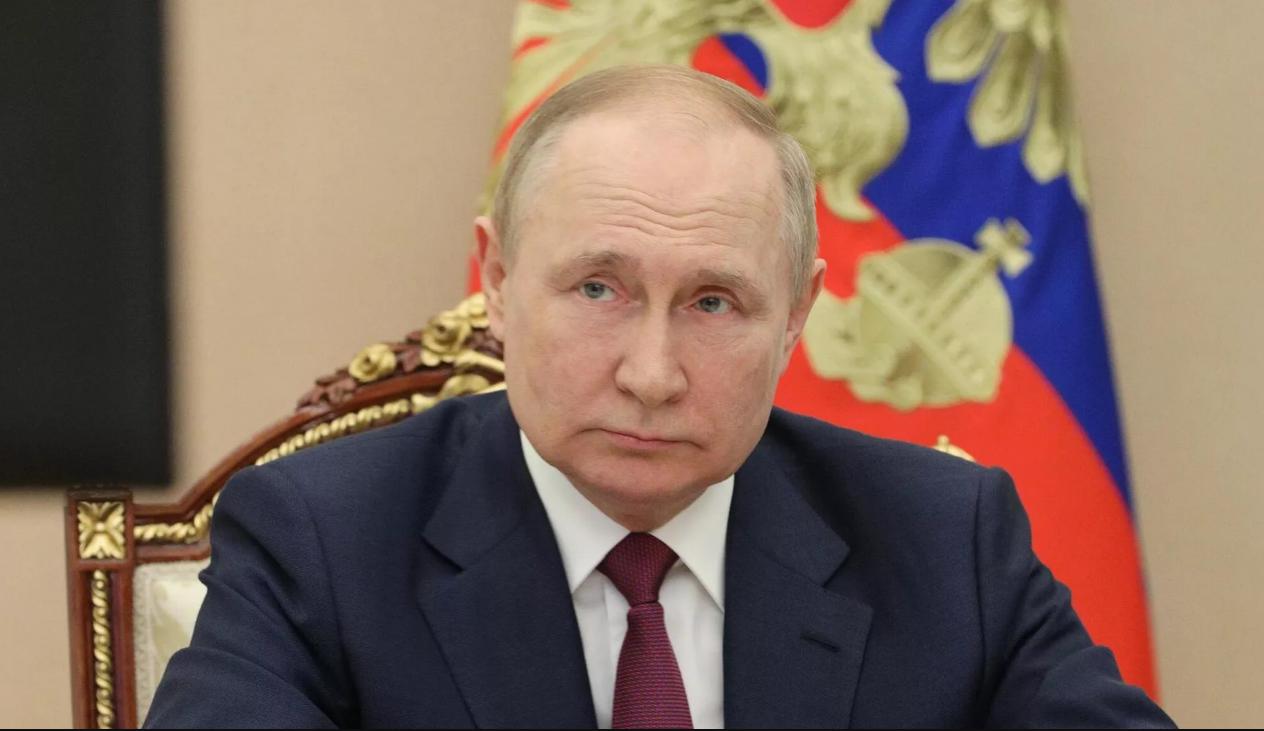
UPDATED Monday December 5 from the Associated Press:
Russian President Vladimir Putin on Monday signed a law that significantly expands restrictions on activities seen as promoting LGBT rights in the country.
MOSCOW – The Upper Chamber of the Russian State Duma (Parliament) voted Wednesday approving legislation banning LGBTQ+ propaganda as well as materials that promote discussion of gender reassignment and mention of LGBTQ+ to minors, which is categorized as promotion of paedophilia. Violation of the ban will result in fines of up to 10 million rubles.
The legislation now heads to Russian President Vladimir Putin who is expected to sign it within the next few days. Russian State Media outlet RIA News (РИА Новости) reported the new ban on LGBTQ+ propaganda, gender reassignment and paedophilia will apply to films, books, commercials, media publications and computer games.
The legislation broadens the scope of the existing “Protecting Children from Information Advocating a Denial of Traditional Family Values,” statute signed into law by Putin on June 30, 2013.
That statute amended the country’s child protection law and the Code of the Russian Federation on Administrative Offenses, to prohibit the distribution of “propaganda of non-traditional sexual relationships” among minors.
The definition includes materials that “raises interest in” such relationships, cause minors to “form non-traditional sexual predispositions”, or “[present] distorted ideas about the equal social value of traditional and non-traditional sexual relationships.”
Businesses and organizations can also be forced to temporarily cease operations if convicted under the law, and foreigners may be arrested and detained for up to 15 days then deported, or fined up to 5,000 rubles and deported.
The new law will extend “responsibility for propaganda of LGBTQ+ people among adults,” in addition to the earlier law regarding minors.
The language of the bill also introduces a ban on issuing a rental certificate to a film if it contains materials that promote non-traditional sexual relations and preferences is established. The document also provides for the introduction of a mechanism that restricts children’s access to listening to or viewing LGBTQ+ information on paid services.
The newly expanded law provides for the Russian Federal Service for Supervision of Communications, Information Technology and Mass Media, abbreviated as Roskomnadzor, to be vested with the right to determine the procedure for conducting monitoring on the Internet to identify information, access to which should be restricted in accordance with the federal law on information.
A requirement is also set on paid services to enter codes or perform other actions to confirm the age of the user. At the same time, access to LGBTQ+ information is prohibited for citizens under 18 years of age.
In addition, it provides for a ban on the sale of goods, including imported goods, containing information, the dissemination of which provides for administrative or criminal liability.
Also, the law “on the protection of children from information harmful to their health and development” is supplemented by an article on the promotion of non-traditional sexual relations, pedophilia and information that can make children want to change their sex.
The latter language pointedly inserted as transgender people have been a frequent target of attacks by the Russian president in speeches recently blaming the West for a global decay in moral values that run counter to what Putin describes as “Russia’s strong morals.”
Human Rights Watch noted that given the already deeply hostile climate for LGBTQ+ people in Russia, there will be uptick in often-gruesome vigilante violence against LGBTQ+ people in Russia—frequently carried out in the name of protecting Russian values and Russia’s children.
Legal scholars say the vagueness of the bill’s language gives room for government enforcers to interpret the language as broadly as they desire, leaving members of the Russian LGBTQ+ community and their allies in a state of even greater fear and stress filled uncertainty.
The English language Moscow Times newspaper and webzine, which publishes outside of the Russian Federation to avoid censorship, ran an article Friday reporting on St. Petersburg LGBTQ activist Pyotr Voskresensky, who in an act of defiance opened up a small “LGBTQ museum” in his apartment prior to Putin’s signing the measure into law.
“The museum is a political act,” said Voskresensky. “As this era is coming to an end, I felt I wanted to say one last word.”
Voskresensky — who has spent years acquiring Russian-made statues, jewelry, vases, books and other art objects that tell stories about the country’s LGBTQ+ subculture — decided this was his last opportunity to share his collection with ordinary people he told the Times.
For safety reasons, the museum’s location has not been made public: hopeful visitors must contact Voskresensky via Facebook to receive the address.
On a recent tour, the first thing visible to visitors at the entrance was a portrait of composer Pyotr Tchaikovsky, one of the most famous gay men in pre-revolutionary Russia.
At the end of the exhibition, there were a few contemporary art pieces, including a satirical model depicting Russian parliamentary deputy Vitaly Milonov, a prominent supporter of the anti-gay legislation, wearing a bridal veil.

(Courtesy of Pyotr Voskresensky via The Moscow Times)
In a phone call with the Blade on Saturday, a young Russian LGBTQ+ activist, who asked to not be identified for fear of Russian government reprisals, and who has communicated with the Blade previously from their Helsinki, Finland safe space, reiterated:
“These [Russian obscenity] politicians want to so-called “non-traditional” LGBTQ+ lifestyles erased out of public life. They and their so called colluders in church are ignorant of truth that LGBTQ+ people will exist no matter what. It is scientific fact not their religious fairytales and fictions.”
The activist also noted that with Putin’s signature, Russian LGBTQ+ people “will cease to be publicly known” effectively driving them underground. “Those bastards have tried to make us erased- they stupidly think we no longer [will] exist” The activist angrily vowed; “we are not disappeared- never. We are human and we are natural and they will not defeat our humanity.”
Russia
Russian Duma’s lower House passes anti-LGBTQ propaganda law
The legislation still needs the approval of the upper House and President Putin- introduces an expanded “all ages” anti-LGBTQ propaganda ban
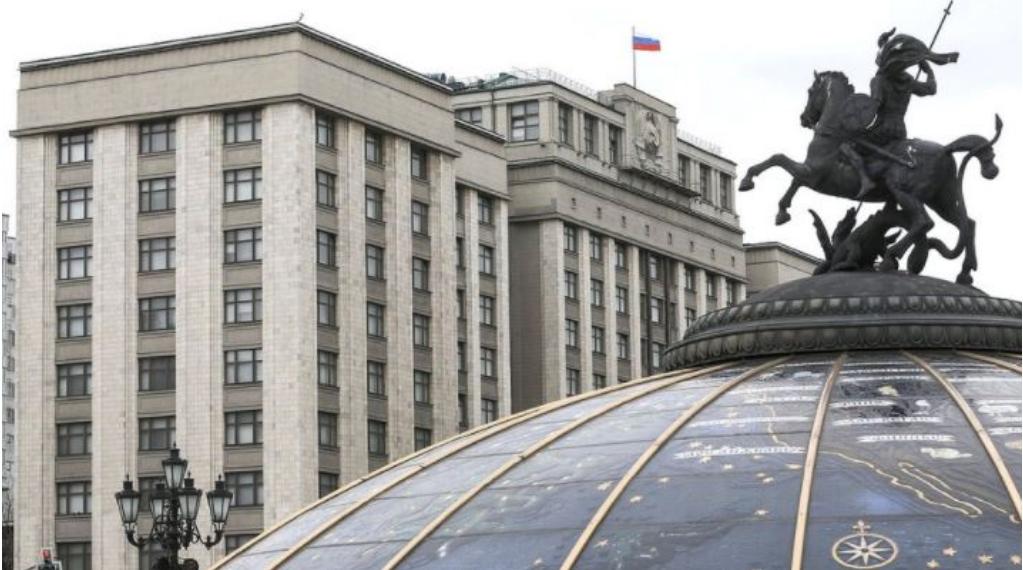
MOSCOW – A new law which expands Russia’s “gay propaganda” law signed by Russian president Vladimir Putin in June 2013 passed the lower House of the State Duma (parliament) on Thursday.
The legislation, which still needs the approval of the upper House of the Duma and President Putin, introduces an expanded “all ages” ban on “propaganda of non-traditional relations,” paedophilia, as well as a ban on the dissemination of information about LGBTQ people in the media, the Internet, advertising, literature and cinema.
The language of the bill, according to the official Russian state news agency TASS, also introduces a ban on issuing a rental certificate to a film if it contains materials that promote non-traditional sexual relations and preferences is established. The document also provides for the introduction of a mechanism that restricts children’s access to listening to or viewing LGBTQ+ information on paid services.
The newly expanded law provides for the Russian Federal Service for Supervision of Communications, Information Technology and Mass Media, abbreviated as Roskomnadzor, to be vested with the right to determine the procedure for conducting monitoring on the Internet to identify information, access to which should be restricted in accordance with the federal law on information.
A requirement is also set on paid services to enter codes or perform other actions to confirm the age of the user. At the same time, access to LGBTQ+ information is prohibited for citizens under 18 years of age.
In addition, it provides for a ban on the sale of goods, including imported goods, containing information, the dissemination of which provides for administrative or criminal liability.
Also, the law “on the protection of children from information harmful to their health and development” is supplemented by an article on the promotion of non-traditional sexual relations, pedophilia and information that can make children want to change their sex.
The latter language pointedly inserted as transgender people have been a frequent target of attacks by the Russian president in speeches recently blaming the West for a global decay in moral values that run counter to what Putin describes as “Russia’s strong morals.”
In an October speech announcing the illegal annexation of four Ukrainian territories, Putin attacked the Western nations on the issue of gay and transgender rights.
“Do we want children from elementary school to be imposed with things that lead to degradation and extinction?” he asked. “Do we want them to be taught that instead of men and women, there are supposedly some other genders and to be offered sex-change surgeries?”
It’s not just the Russian leader. Patriarch Kirill, head of the powerful and influential Russian Orthodox Church, portrayed the war with Ukraine as a struggle seeking to reject Western values and LGBTQ+ pride parades.
Vyacheslav Viktorovich Volodin, the Chairman of the State Duma and a former aide to Putin, is one of the bill’s sponsors. Volodin told TASS that the bill is “adopted exclusively in the interests of all Russians.”
“We have a different path, our grandfathers, great-grandfathers, grandmothers, great-grandmothers chose it. We have traditions, we have a conscience, we have an understanding that we need to think about children, families, the country, to preserve what we handed over by the parents,” Volodin said.
A spokesperson for Human Rights Watch told the Blade this expansion of the 2013 “gay propaganda” law “is a classic example of political homophobia. It targets vulnerable sexual and gender minorities for political gain.”
A young Russian LGBTQ+ activist, who asked to not be identified for fear of Russian government reprisals, spoke to the Blade from Helsinki, Finland, regarding this latest effort by the so-called conservative “family values” politicians in the Duma.
“This is a distraction to avoid the real news of dead young Russian males killed in his illegal war in Ukraine,” they said. “These [Russian obscenity] politicians want to so-called “non-traditional” LGBTQ+ lifestyles practised by lesbians, gay men, bisexuals and transgender people out of public life- make us erased. They and their so called colluders in church are ignorant of truth that LGBTQ+ people will exist no matter what. It is scientific fact not their religious fairytales and fictions.”
The activist also told the Blade they had fled to avoiding the Russian military draft enacted by Russia to replenish the levels of combat troops fighting in Putin’s illegal war, in the face of mounting casualties and wounded soldiers.
HRW noted that given the already deeply hostile climate for LGBTQ+ people in Russia, the organization warned there will be uptick in often-gruesome vigilante violence against LGBTQ+ people in Russia—frequently carried out in the name of protecting Russian values and Russia’s children.
Legal scholars say the vagueness of the bill’s language gives room for government enforcers to interpret the language as broadly as they desire, leaving members of the Russian LGBTQ+ community and their allies in a state of even greater fear and stress filled uncertainty.
Russia
Report: Brittney Griner transferred to penal colony
Reuters noted WNBA star in country’s Mordovia region

YAVAS, Russia — Reuters on Thursday reported WNBA star Brittney Griner is now in a penal colony in Russia’s Mordovia region.
Officials at Moscow’s Sheremetyevo Airport in February detained Griner — a Phoenix Mercury center and two-time Olympic gold medalist who is a lesbian and married to her wife, Cherelle Griner — after customs inspectors allegedly found hashish oil in her luggage. The State Department has determined that Russia “wrongfully detained” her.
A Russian court on Aug. 4 convicted Brittney Griner of smuggling drugs into the country and sentenced her to nine years in a penal colony. An appellate court on Oct. 25 denied Brittney Griner’s appeal.
American officials have publicly acknowledged their willingness to release Viktor Bout, a Russian arms dealer who is serving a 25-year prison sentence in the U.S., as part of a deal to secure the release of Brittney Griner and Paul Whelan, another American citizen who is serving a 16-year prison sentence in Russia after his conviction for spying.
Brittney Griner’s lawyers earlier this month said authorities were transferring her to a penal colony.
Her whereabouts had not been known for nearly two weeks.
Reuters reported Brittney Griner is now at a female penal colony in Yavas, a city in Russia’s Mordovia region that is roughly 300 miles southeast of Moscow. Reuters noted Whelan is at a penal colony in the same area.
“We are aware of reports of her location, and in frequent contact with Ms. Griner’s legal team,” a State Department spokesperson told the Washington Blade on Thursday. “However, the Russian Federation has still failed to provide any official notification for such a move of a U.S. citizen, which we strongly protest. The embassy has continued to press for more information about her transfer and current location.”
-

 Viewpoint3 days ago
Viewpoint3 days agoI’m a queer Iranian Jew. Why I stand with Israel during this conflict
-

 Congress3 days ago
Congress3 days agoWhite House finds Calif. violated Title IX by allowing trans athletes in school sports
-
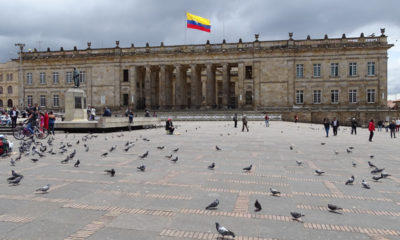
 Colombia4 days ago
Colombia4 days agoColombia avanza hacia la igualdad para personas trans
-

 News4 days ago
News4 days agoDrama unfolds for San Diego Pride ahead of festivities
-

 a&e features2 days ago
a&e features2 days agoLatina Turner comes to Bring It To Brunch
-

 Books1 day ago
Books1 day agoTwo new books on dining out LGBTQ-style
-

 Television2 days ago
Television2 days ago‘White Lotus,’ ‘Severance,’ ‘Andor’ lead Dorian TV Awards noms



